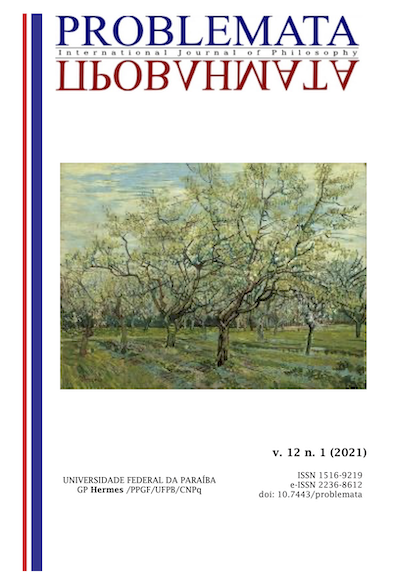TOWARDS A HISTORY OF PHILOSOPHY OF SCIENCE
DOI:
https://doi.org/10.7443/problemata.v12i1.55358Keywords:
Philosophy of Science, History of Philosophy of Science, Science methodology, Received view, MethodAbstract
In order to be accepted as scientific projects worth funding and/or as research papers worth publishing, scientists must, through sound methodological canons, that that piece of work “is Science”. The accepted methodological descriptions are, however, are often dated and committed with philosophical views of what Science is which are already deeply criticized and no longer accepted in the Philosophy of Science community. A critical history of Philosophy of Science is needed for clarifying what problems the adoption of a given method is likely to raise. This modest communication raises this problem and sketches a direction of such history.
Downloads
References
Aristotle. (I-XV). Categories.
Bacon, F. (1984). Novum organum ou verdadeiras indicações acerca da interpretação da natureza; Nova Atlântida.
Beiser, F. C. (2015). Neo-Kantianism. In M. N. G. Forster, Kristin (Ed.), The Oxford Handbook of German Philosophy in the Nineteenth century. Oxford: OUP.
Boudry, M., & Pigliucci, M. (2018). Science Unlimited?: The Challenges of Scientism: University of Chicago Press.
Carnap, R. (1966). Theory and Observation. In T. A.-K. McGrew, M.; Allhoff, F. (Ed.), Philosophy of Science - an historical anthology (pp. 329-343). London: Wiley-Blackwell.
Descartes, R. (1641). René Descartes: Meditations on first philosophy: With selections from the objections and replies: Cambridge University Press, 2013.
DeWitt, R. (2018). Worldviews: An introduction to the history and philosophy of science: John Wiley & Sons.
Heis, J. (2018). Neo-Kantianism. In E. N. Z. (ed.) (Ed.), The Stanford Encyclopedia of Philosophy
Hume, D. (1739). A treatise of human nature. In: New York, NY, Barnes & Noble, 2005.
Kant, I. (1787). critique of pure reason (N. K. Smith, Trans.): Read Books Ltd, 2011.
Lancaster, J. A. (2019). Daniel McKaughan and Holly VandeWall, eds. The History and Philosophy of Science: A Reader. London: Bloomsbury Academic, 2018. Pp. xxiii+ 1073. $49.95.
Laudan, L. (1983). The demise of the demarcation problem. In Physics, philosophy and psychoanalysis (pp. 111-127): Springer.
Matthews, M. R. (2014). Science teaching: The contribution of history and philosophy of science: Routledge.
McMullin, E. (1970). The history and philosophy of science: A taxonomy.
Passmore, J. (1966). A hundred years of philosophy. London: Duckworth & Co Ltd
Pigliucci, M. (2013). The demarcation problem. A (belated) response to Laudan. Philosophy of pseudoscience: Reconsidering the demarcation problem, 9.
Plato. (142a–210d). Theaetetus (Vol. 142a–210d).
Popper, K. (2012). Objective knowledge: an evolutionary approach: Oxford: Clarendon Press.–1979.–395 p.
Porta, M. A. G. (2005). Zurück zu Kant–Adolf Trendelenburg, la superación del idealismo y los orígenes de la filosofía contemporánea. Doispontos, Curitiba, São Carlos, 2(2), 35-59.
Quine, W. V. (1951). Main trends in recent philosophy: Two dogmas of empiricism. The philosophical review, 20-43.
Suppe, F. (1977). The search for philosophic understanding of scientific theories (Vol. 2).
Downloads
Published
Versions
- 2022-08-09 (2)
- 2021-08-17 (1)
Issue
Section
License
Copyright (c) 2021 Marcos Amatucci

This work is licensed under a Creative Commons Attribution 4.0 International License.
Authors who publish with this journal agree to the following terms:
- Authors retain copyright and grant the journal right of first publication with the work simultaneously licensed under a Creative Commons Attribution License that allows others to share the work with an acknowledgement of the work's authorship and initial publication in this journal.
- Authors are able to enter into separate, additional contractual arrangements for the non-exclusive distribution of the journal's published version of the work (e.g., post it to an institutional repository or publish it in a book), with an acknowledgement of its initial publication in this journal.
-
- Authors are permitted and encouraged to post their work online (e.g., in institutional repositories or on their website) prior to and during the submission process, as it can lead to productive exchanges, as well as earlier and greater citation of published work (See The Effect of Open Access).





